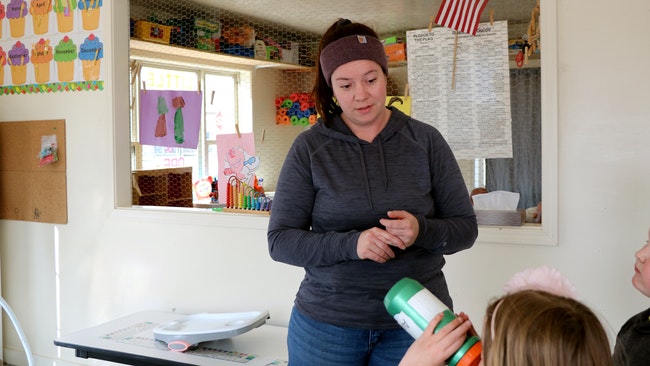 Chelsie Bates, owner of Little Hands Childcare and Preschool in Vale, said the state’s move to temporarily remove copays for families who rely on subsidies for childcare is a huge relief. (The Enterprise/Yadira Lopez)
Chelsie Bates, owner of Little Hands Childcare and Preschool in Vale, said the state’s move to temporarily remove copays for families who rely on subsidies for childcare is a huge relief. (The Enterprise/Yadira Lopez)
VALE – In a move to help families and child care providers, the state is making temporary changes to child care benefits provided by the state Department of Human Services.
Families who rely on the employment-related day care program, which helps low-income households pay for childcare, for now no longer will have to pay any share of the cost.
The directive also raised the income limit for eligibility. This means more families can now apply for the aid.
“It’s huge,” said Chelsie Bates, owner of Little Hands Childcare and Preschool in Vale. “It means keeping our doors open and keeping our staff because they’re in the same boat. We’re all trying to figure out if we’re going to have a job to come home to.”
Gov. Kate Brown said in a statement that the state must do everything it can to ensure child care providers can operate so parents can continue to work.
The changes will last as long as Oregon remains in a state of emergency, which Brown declared on March 8 and put into effect for at least 60 days.
It’s a relief for people like Bates, who is the only licensed child care provider in Vale. She has 28 children enrolled in her center and about 70% of her families currently count on the state to help pay for that care.
Many of her families’ income levels are just $100 to $200 shy of qualifying for the aid.
After finding out the news, she quickly notified her clients and encouraged them to apply now that the income limit has been raised.
Employees at the department’s Ontario office are currently relying on telework. The best way for clients to reach them now is by phone at 541-889-9141, extension 0.
At Giggles and Grace Early Learning Center, Inc. in Ontario, roughly 15 families rely on the subsidies.
The site’s executive director, Shawn Reynolds, said the temporary changes “will make this difficult time easier” for those families.
“This temporary change was a pleasant surprise from the state to add to our additional supports,” Reynolds wrote in an email.
 Little Hands Childcare and Preschool is the only licensed provider in Vale. (The Enterprise/Yadira Lopez)
Little Hands Childcare and Preschool is the only licensed provider in Vale. (The Enterprise/Yadira Lopez)
Previously, families could only make up to 185 percent of the federal poverty level – or $4,040 per month for a family of four. That limit was temporarily raised to 250 percent of the federal poverty level or $5,899.
“I’ve always told my parents it’s not a handout. Child care is expensive,” Bates said.
Locally many families don’t take advantage of the state’s subsidies, said Dan Ramirez, self sufficiency programs manager at the Department of Human Services in Ontario. These families simply can’t afford the copay, he said, so the move to get rid of copays for now can make a big difference.
As of February, 23 child care providers were listed and approved to receive payments from the department. In that same month, 46 families – 122 children – received employment-related day care funds in Malheur County.
As she spoke to a reporter Tuesday, Bates’ phone buzzed three times with text messages from parents asking her for help with the state forms.
Interested parents need only call the Department of Human Services or fill out the forms online.
Even if they can’t speak to a representative right away, the state will cover costs retroactively if a family is approved.
The changes also expanded absent day policies. This means child care providers will charge the state for up to a full month for children scheduled to be in care but who are unable to attend due to the COVID-19 virus.
For Bates it’s a relief. A lot of her clients who work in schools and restaurants are now home due to closures.
“I need to stay open because it’s my source of income,” Bates said.
The virus has already affected her business in other ways. Her biggest concern is access to food.
“It’s hard enough to go buy food for a family right now, but even harder to buy food for 20 kids a day,” Bates said.
Food costs at her operation come from her own pocket and Bates does the shopping herself. She said her budget for the week has doubled since she’s had to stay away from discount supermarkets.
“It’s not safe right now to go to a Walmart or a Waremart,” she said.
Parents are dropping off children at the door and keeping their distance. Teachers at the center are whisking kids to the sink to wash their hands.
The goal is to keep the quality the same and minimize the disruptions to the kids’ routine because “they don’t understand what’s going on,” Bates said.
She’s got back-up teachers who will fill in if any of her employees need to stay home.
With four of her own children at home, Bates had to request an exception from the state so she can maintain the mandated teacher-to-child ratios at her center while keeping her own children at home.
She’s limited to serving only families that are currently enrolled at her day center.
Bates said she’ll continue to serve the community as long as she’s allowed to. She’s hoping over the next week she can have a better idea of how she can offer more care at this time.
“We’re trying to see how we can best serve the community,” Bates said. “We’re staying busy.”
Have a news tip? Reporter Yadira Lopez: [email protected] or 541-473-3377
SUBSCRIBE TO HELP PRODUCE VITAL REPORTING — For $5 a month, you get breaking news alerts, emailed newsletters and around-the-clock access to our stories. We depend on subscribers to pay for in-depth, accurate news produced by a professional and highly trained staff. Help us grow and get better with your subscription. Sign up HERE.




